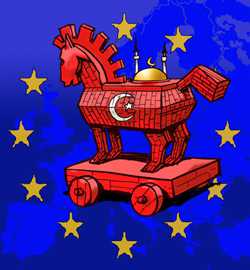By Sean O’Grady, Economics Editor
In a humiliating move, Britain has been relegated from the premier league of international economies by one of the world’s leading credit agencies.
Standard & Poor’s’ concerns about government borrowing and the potential cost of rescuing the UK’s rickety banking system – as much as £145bn – are so serious that the agency has taken the unprecedented step of downgrading the creditworthiness of the British Government. The UK has lost its cherished AAA rating with a “stable outlook”, the highest possible, to a triple-A rating with a “negative outlook”. Worse could follow. The agency said that “UK public finances are deteriorating rapidly” and warned about a further downgrade: “The rating could be lowered if we conclude that, following the election, the next government’s fiscal consolidation plans are unlikely to put the UK debt burden on a secure downward trajectory over the medium term.”
While only one word of the formal S&P rating has been altered, the implications of the change could hardly be more momentous. Sterling, the gilts market and the FTSE 100 index all fell sharply on the news, which came shortly after the Office for National Statistics announced the latest figures for government borrowing – £85bn in April alone, four times the level this time last year and described by one City analyst as “awful”.
The lower S&P rating means the national debt will be more expensive to service and generally add to the growing pressure on public spending. And the economy may not return quickly to the sort of growth that would restore tax revenues and prevent unemployment climbing to about 3 million by this time next year.
The Deputy Governor of the Bank of England, Charlie Bean, reminded the nation in a speech last night that “we are still some way from having banks that feel sufficiently secure that they can lend normally, and investors that have enough confidence in the banks to provide them with sufficient funds”. He acknowledged signs of recovery but, “unfortunately these encouraging signs – I hesitate to identify them as ‘green shoots’ – do not tell us much about the strength and durability of the subsequent recovery”.
With government borrowing of about £350bn scheduled over the next two years and a total national debt approaching £1.5 trillion – £1,500,000,000,000 – S&P voiced concerns that no government would be able to tackle the issue: “Even assuming additional fiscal tightening, the net general government debt burden could approach 100 per cent of GDP and remain near that level in the medium term… These projections reflect our more cautious view of how quickly the erosion in the Government’s revenue base may be repaired, the extent to which the growth in government spending can be curtailed, and consequently the pace at which historically high fiscal deficits are likely to narrow.”
The immediate concern is how the downgrade will affect the cost of servicing Britain’s burgeoning public debt. Robert Stheeman, chief executive of the Debt Management Office, the government agency responsible for financing the deficit, admitted in an interview for Channel 4 News that the cost of paying the interest on government debts was rising: “I don’t see it turning into spiral, but it is getting significant, a significant part of government spending.”
The shadow Chancellor, George Osborne, said “Labour is putting our economic stability at risk by refusing to face up to the debt crisis it has created”. His Liberal Democrat counterpart, Vincent Cable, called on ministers to “come clean about how it intends to pay back its debt”.
The Treasury minister Stephen Timms replied that the Treasury had “set out plans in the Budget to halve the deficit over the next four years and to bring the public finances back into balance in the medium term”.
The downgrade represents a historic moment, as it leaves the UK on an inferior credit rating to France, the US, German, Sweden, the Netherlands and even Guernsey. Spain and Ireland both lost their triple-A ratings in recent weeks. Japan lost its AAA rating in 2001. Ministers will hope that the UK does not follow them further down to join Greece and Portugal in the international finance equivalent of the Championship, or even League One.
Source: www.independent.co.uk, 22 May 2009







